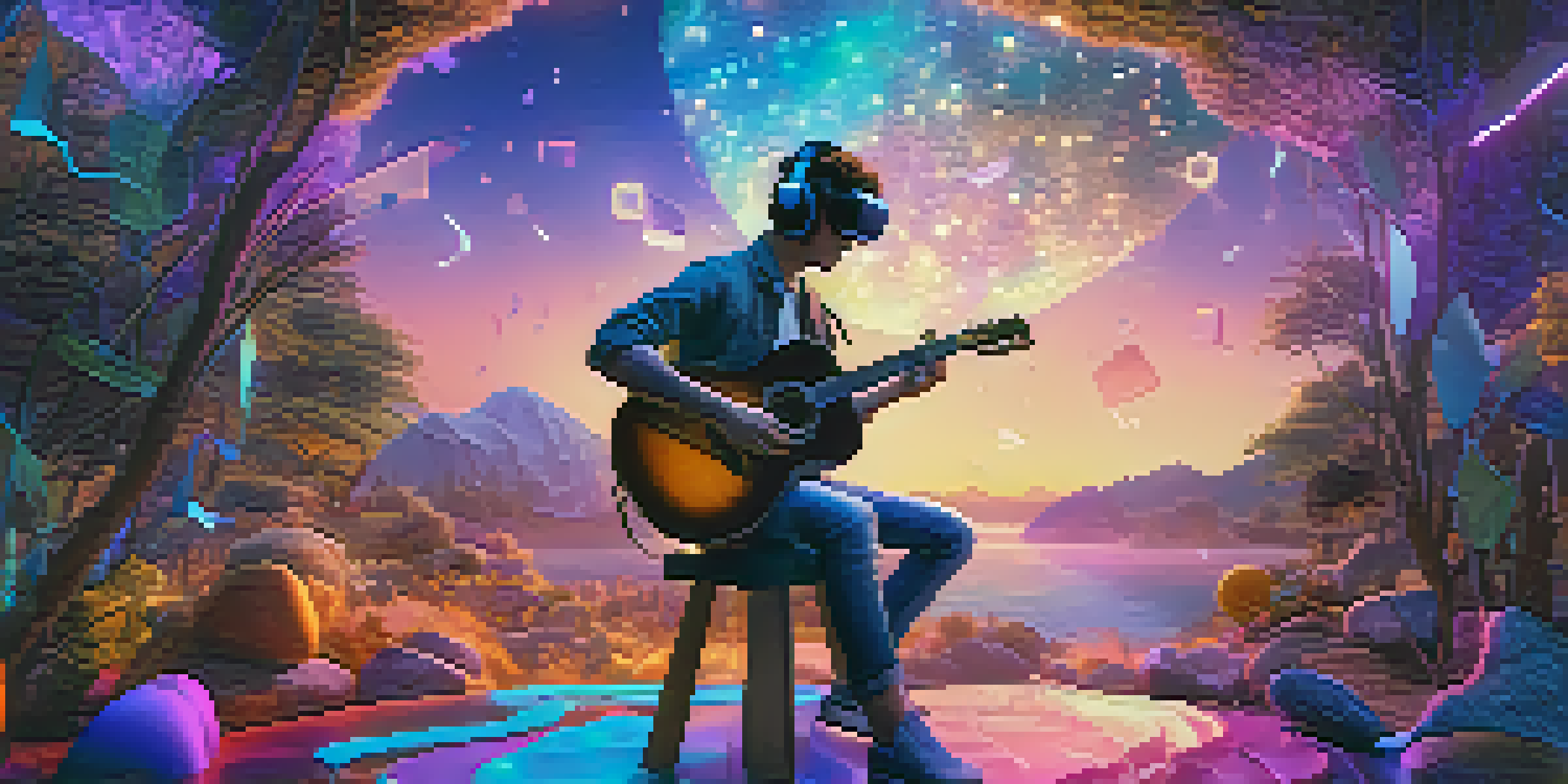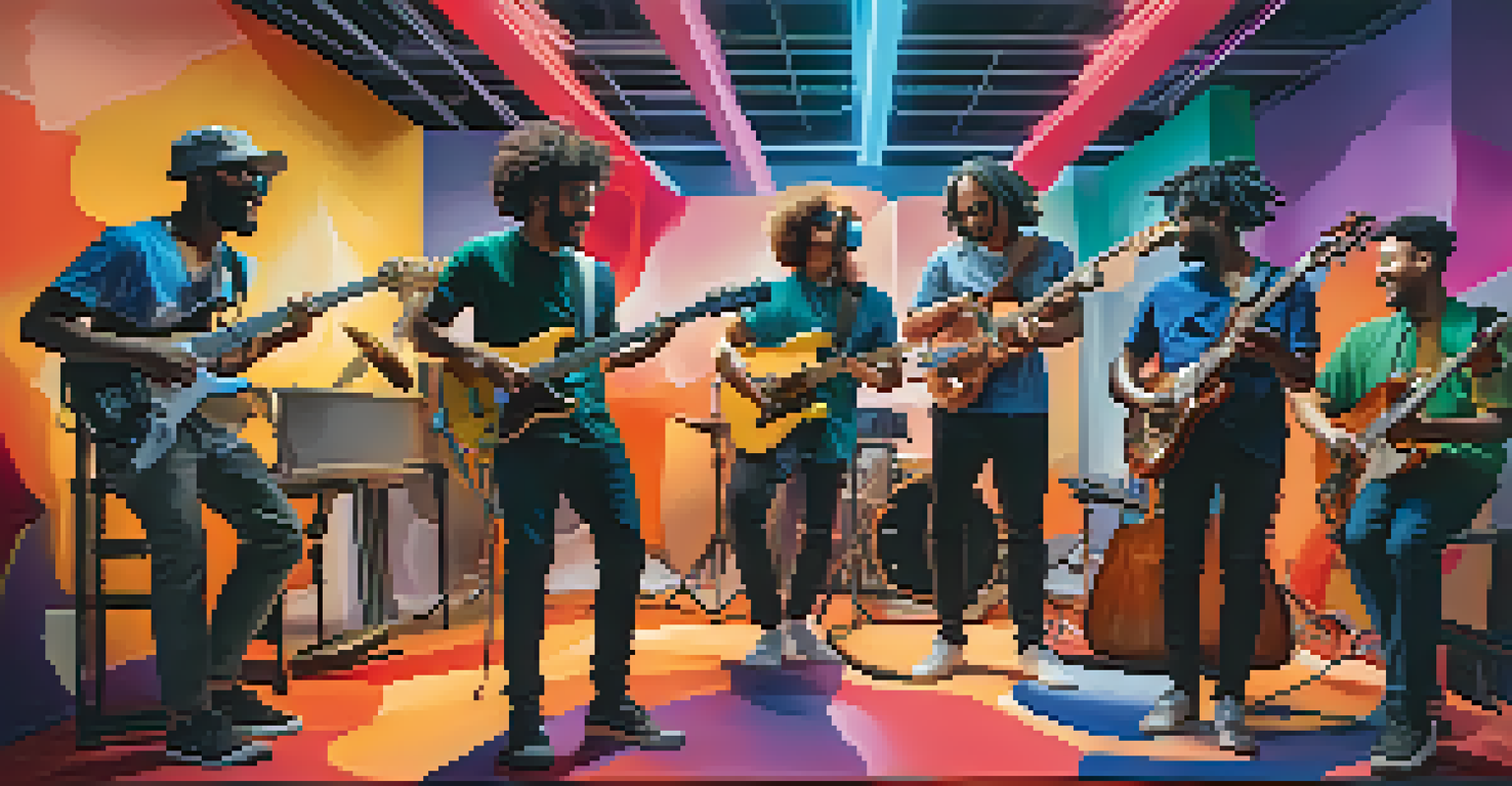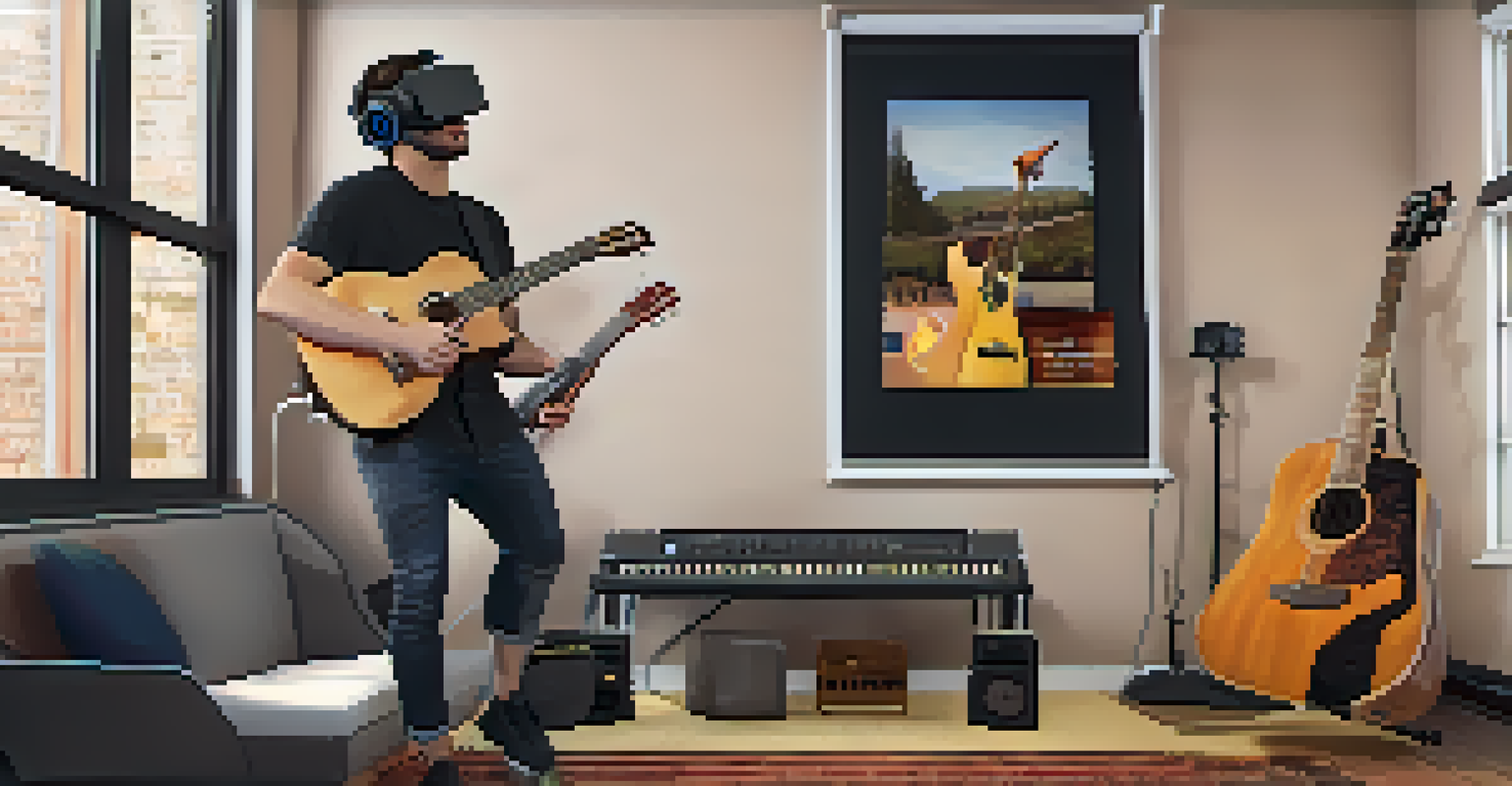Virtual Reality: The Future of Guitar Learning and Playing

Introduction: The Rise of Virtual Reality in Music Education
Virtual reality (VR) is revolutionizing how we learn and play music, especially the guitar. Imagine strumming chords in a 3D environment where you can see your fingers move in real-time. This technology makes practicing more immersive and engaging, breaking the traditional confines of music education. As VR becomes more accessible, its potential to reshape guitar learning is becoming increasingly apparent.
Music can change the world because it can change people.
Many aspiring guitarists struggle with motivation and guidance. VR offers a unique solution by creating interactive lessons that feel like you're with a personal instructor. With virtual environments, learners can practice skills at their own pace, making it easier to grasp complex techniques. This shift not only enhances learning but also keeps players excited about their musical journey.
The integration of VR into guitar education is not just a trend; it's a glimpse into the future of music learning. As developers create more sophisticated VR platforms, the possibilities for guitarists are endless. Whether you're a beginner or a seasoned player, the immersive nature of VR can enhance your skills and deepen your love for music.
How VR Enhances Guitar Practice Sessions
One of the standout features of VR is its ability to transform mundane practice sessions into fun and dynamic experiences. Imagine being transported to a virtual stage, playing alongside your favorite artists, or even in a band setting. This kind of environment helps simulate real-life performance scenarios, making practice more relevant and enjoyable.

Additionally, VR provides real-time feedback on your playing technique. Many applications analyze your performance, highlighting areas that need improvement. This instant feedback loop is invaluable for refining your skills and boosting your confidence. As you play, you can see visual cues that guide you on finger placement and timing, which traditional methods might overlook.
VR Transforms Guitar Learning
Virtual reality makes guitar education more engaging by creating immersive environments where learners can practice with real-time feedback.
Moreover, the gamification aspect of VR can motivate players to practice more frequently. Many platforms incorporate challenges and rewards, making it feel less like work and more like play. This approach not only encourages regular practice but also fosters a sense of community among users, as they can share achievements and progress with friends.
Interactive Learning: A New Approach to Guitar Lessons
Traditional guitar lessons can sometimes feel static and uninspiring. In contrast, VR lessons offer an interactive and engaging way to learn. With virtual instructors guiding you through each lesson, you can practice alongside them, mimicking their movements and techniques in a visually rich environment.
Technology is best when it brings people together.
This interactive approach caters to various learning styles, making it easier for students to grasp concepts that may be difficult to understand through video or books alone. For example, visual learners benefit from seeing finger placements in 3D, while auditory learners can hear music in a more immersive setting. This creates a multi-sensory experience that enhances retention and understanding.
Furthermore, the flexibility of VR allows students to revisit lessons at their convenience. Missed a crucial technique? No problem! You can replay the lesson as many times as needed until you feel confident. This adaptability empowers learners to take control of their education, leading to more effective and personalized guitar learning.
Collaborative Jam Sessions in Virtual Reality
Imagine jamming with friends or fellow musicians from around the world, all without leaving your living room. VR facilitates collaborative experiences where guitarists can connect and play together in real-time. This feature not only enhances social interaction but also provides valuable opportunities for learning from other players.
In these virtual jam sessions, players can experiment with different styles and genres, broadening their musical horizons. For instance, you could strum along with a blues guitarist or join a rock band, all while receiving tips and feedback from your virtual bandmates. These collaborative experiences can inspire creativity and innovation in your playing.
Cost-Effective Learning Solutions
VR platforms provide affordable and accessible guitar lessons, eliminating the high costs associated with traditional music education.
Moreover, the community aspect of VR helps build connections with fellow musicians. As you share experiences and progress, you might even form lasting friendships and collaborations. This sense of belonging can be a powerful motivator, keeping you engaged and excited about your guitar journey.
Cost-Effective Solutions for Guitar Learning
One significant advantage of VR guitar learning solutions is their cost-effectiveness. Traditional lessons can be expensive, with hourly rates adding up quickly, especially for those just starting out. In contrast, many VR platforms offer affordable subscription models or one-time purchases, making quality guitar education accessible to a broader audience.
Additionally, VR eliminates the need for physical materials, such as books or sheet music, which can also be costly. Most VR applications come equipped with all the resources you need, from chord charts to instructional videos. This not only saves money but also reduces clutter, allowing you to focus solely on your musical development.
As VR technology continues to evolve, we can expect even more affordable options to emerge. This accessibility means that more people can pursue their passion for guitar playing without breaking the bank, creating a more inclusive environment for aspiring musicians everywhere.
Overcoming Common Challenges in Guitar Learning
Learning guitar can sometimes feel daunting, especially for beginners facing common challenges like finger dexterity and coordination. VR provides targeted exercises to address these issues in a fun and engaging way. Instead of practicing alone, you can play alongside virtual instructors who guide you through exercises specifically designed to build your skills.
Moreover, the immersive nature of VR helps players focus and reduces distractions during practice. In a world filled with distractions, it's easy to lose motivation or get sidetracked. However, VR environments are designed to keep you immersed in the music, allowing for deeper concentration and more productive practice sessions.
Enhancing Collaboration in Music
VR allows guitarists to jam and collaborate with musicians globally, fostering a sense of community and creativity in their musical journeys.
Finally, VR can help alleviate performance anxiety by simulating live performances in a safe environment. As you practice in front of virtual audiences, you can build confidence and reduce nerves before stepping onto an actual stage. This gradual exposure to performance scenarios prepares you for real-world situations, helping to transform anxiety into excitement.
The Future of Guitar Learning: Embracing Technology
As we look ahead, it's clear that technology will continue to shape the way we learn and experience music. Virtual reality is just one facet of this evolution, but its impact on guitar education is profound. From interactive lessons to virtual jam sessions, the possibilities are limitless, paving the way for a new generation of musicians.
Embracing this technology means staying adaptable and open to new methods of learning. As more musicians and educators recognize the benefits of VR, we can expect to see a shift in how guitar education is approached. This shift will not only enhance individual learning experiences but also foster a greater sense of community among players.

Ultimately, the future of guitar learning lies in the intersection of technology and creativity. By leveraging VR, we can unlock new potentials for learning, collaboration, and expression. Whether you're a beginner or a seasoned player, now is the perfect time to explore how virtual reality can elevate your guitar journey.